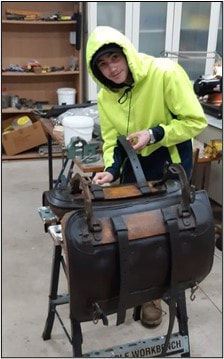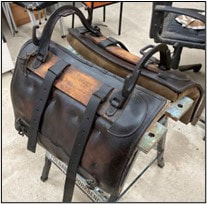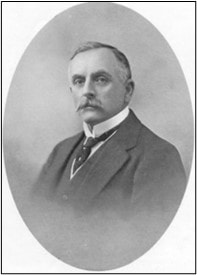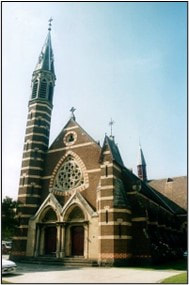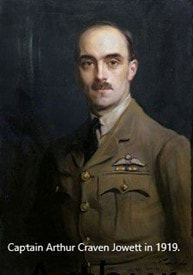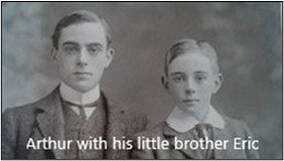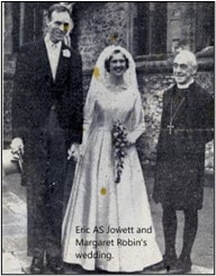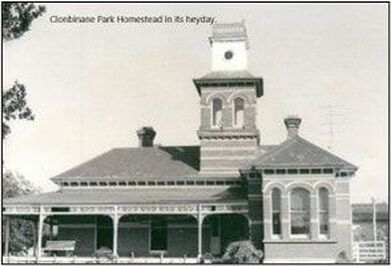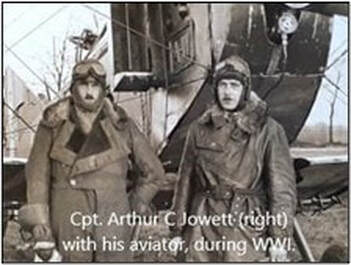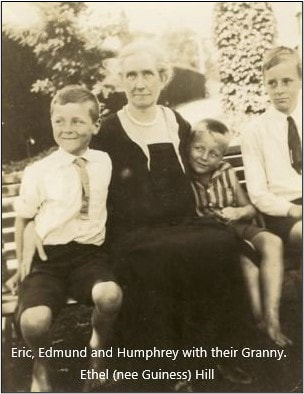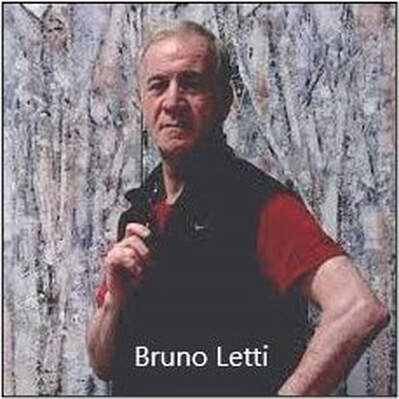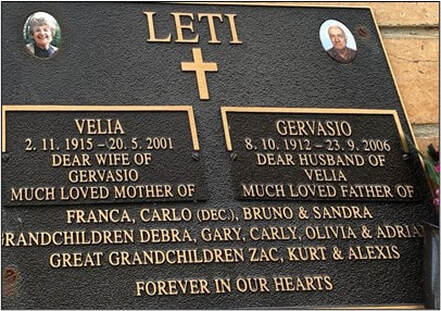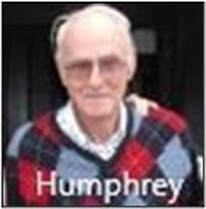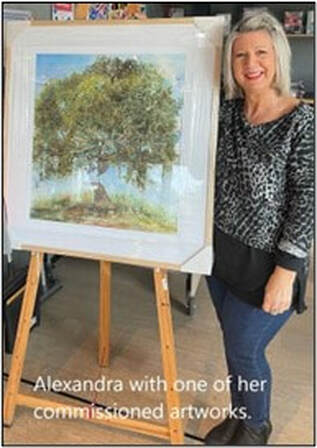Background. How did we become interested in Captain Arthur Jowett?
Thanks again to Jesse from BALTS (Broadford Alternative School) for his work restoring historic items from the Broadford Historical Society. We have an old pack-saddle from 1915, which we believe once belonged to Captain Arthur Craven Jowett of Clonbinane Park. It was badly in need of some care and attention, and Jesse was just the one to do it for us.
Under supervision from the fellas at Broadford Men’s Shed, Jesse has brought it back to life. The rust has gone, and the leather has been oiled and polished. Captain Jowett would be so pleased to know that is still around and looking like new, almost.
Speaking of Captain Jowett, I knew nothing about him at all. What a fascinating story! With the help of the internet, I have been able to put together a story that I’d like to share with you over the next few days. So many twists and turns, and so many connections with Broadford!
Thanks again to Jesse from BALTS (Broadford Alternative School) for his work restoring historic items from the Broadford Historical Society. We have an old pack-saddle from 1915, which we believe once belonged to Captain Arthur Craven Jowett of Clonbinane Park. It was badly in need of some care and attention, and Jesse was just the one to do it for us.
Under supervision from the fellas at Broadford Men’s Shed, Jesse has brought it back to life. The rust has gone, and the leather has been oiled and polished. Captain Jowett would be so pleased to know that is still around and looking like new, almost.
Speaking of Captain Jowett, I knew nothing about him at all. What a fascinating story! With the help of the internet, I have been able to put together a story that I’d like to share with you over the next few days. So many twists and turns, and so many connections with Broadford!
THE CAPTAIN ARTHUR CRAVEN JOWETT STORY. Part 1.
Arthur Craven Jowett was born at St. Kilda in Melbourne in 1889, but let’s put it all into perspective by starting the story with Arthur’s father, Edmund Jowett.
Edmund Jowett had been born in Yorkshire, England, and came out to Australia with his father and his older brother when he was just 18 years old. Edmund’s uncle owned a woollen mill in Yorkshire, and after leaving school, Edmund had learned about “the Wool Trade” there. Though he didn’t have any capital when he arrived in Melbourne, he gradually acquired pastoral properties in Queensland, New South Wales and Victoria. (Maybe young Edmund had access to “The-Bank-of-Mum-and-Dad”?)
In 1883 he married Melbourne-born, Annette McCallum. He was 25 and she was 21. They were married in St George’s Presbyterian Church in St Kilda East. The church is still there today. They had 5 children, and Arthur was the middle child, between 2 older sisters, and a younger sister and finally, a brother.
When Edmund died in Queensland, in 1936, at the age of 78, he owned over 40 properties, totalling more than 6-million acres. He was also a politician and an early deputy leader of the Australian Country Party. (He had entered politics after his youngest son, Eric, was killed during WW1.) He was a keen supporter of Conscription.)
It was reported in the Bulletin magazine that when he died, he owned more sheep than anyone else in the world!
Photos below: Edmund Jowett and St George's Presbyterian Church in St. Kilda East today.
Arthur Craven Jowett was born at St. Kilda in Melbourne in 1889, but let’s put it all into perspective by starting the story with Arthur’s father, Edmund Jowett.
Edmund Jowett had been born in Yorkshire, England, and came out to Australia with his father and his older brother when he was just 18 years old. Edmund’s uncle owned a woollen mill in Yorkshire, and after leaving school, Edmund had learned about “the Wool Trade” there. Though he didn’t have any capital when he arrived in Melbourne, he gradually acquired pastoral properties in Queensland, New South Wales and Victoria. (Maybe young Edmund had access to “The-Bank-of-Mum-and-Dad”?)
In 1883 he married Melbourne-born, Annette McCallum. He was 25 and she was 21. They were married in St George’s Presbyterian Church in St Kilda East. The church is still there today. They had 5 children, and Arthur was the middle child, between 2 older sisters, and a younger sister and finally, a brother.
When Edmund died in Queensland, in 1936, at the age of 78, he owned over 40 properties, totalling more than 6-million acres. He was also a politician and an early deputy leader of the Australian Country Party. (He had entered politics after his youngest son, Eric, was killed during WW1.) He was a keen supporter of Conscription.)
It was reported in the Bulletin magazine that when he died, he owned more sheep than anyone else in the world!
Photos below: Edmund Jowett and St George's Presbyterian Church in St. Kilda East today.
THE CAPTAIN ARTHUR CRAVEN JOWETT STORY. Part 2.
Young Arthur Jowett was born and grew up in Melbourne. He went to school and later, university, in Melbourne, before traveling to England and continuing his studies at Cambridge University. In 1914 he joined the Royal Flying Corps, rising to the position of Captain and serving until 1918. While at Cambridge, he met and married Evelyn Frances Hill, in 1915. She was Australian, having been born in Rockhampton two years before Arthur, and educated in England at a French-speaking school in Bournemouth. At the time of their marriage, Captain Arthur Craven Jowett was serving with the Northumberland Fusiliers and later the Royal Flying Corps.
When the War finished, Arthur and Evelyn returned to Australia and worked on properties owned by Arthur’s father, Edmund. They had 4 children, Doreen (born 1918), Humphrey (born 1921), Eric (born 1926) and another Edmund (born 1929). Arthur was recorded as being a “grazier”, like his own father.
At one stage Arthur lived at Clonbinane Park Homestead, the lovely old home built south of Clonbinane, and just off the Anderson’s Gardens Road. Tragically, the building was totally destroyed in the 2009 Black Saturday bushfires. (See photo) The homestead was built by the famous M.K. Mackenzie around 1885. In 1922 Clonbinane Park, where the homestead stood, was a property of 1924 acres with “excellent potential for cattle grazing and wool production”.
Doreen G Jowett was a doctor and an anaesthetist. She moved to England and married Jestyn Reginald Austin Plantagenet Phillips, 2nd Viscount St Davids.
Viscount and Lady St. Davids had 6 children before the couple were divorced in 1954. Doreen returned to Melbourne and she died there in 1956.
Humphrey A C Jowett, was born in 1921 in Toowoomba, Queensland, He married Elizabeth Smallpeice in 1945. Interestingly, Elizabeth was a relative of Viscount St Davids, the man who married his sister, Doreen. They had two children during their marriage. Humphrey enlisted in the RAAF in 1941 and is registered as a Flight lieutenant. In 2016, at the age of 95, Humphrey died in Southampton, and was later buried in St Kilda, Victoria. Australia.
Eric A S Jowett, born 1926, married an English lady named Margaret Robin in England in 1961. The couple had met in Australia and Eric was described as an Australian sheep farmer. He died around 2007 in Yea, Victoria. She died 10 years later, aged 84, in Brighton, Victoria.
Edmund A D Jowett, youngest son of Captain Arthur Craven Jowett, was born 1929 in St Kilda like his father. He married his wife, Conchita, and they had one child. This Edmund worked as a teacher and at one stage lived at Clonbinane Park Homestead. The Jowett family owned the old home when it was destroyed by the Black Saturday bushfires, and I believe they still own the land, today.
Young Arthur Jowett was born and grew up in Melbourne. He went to school and later, university, in Melbourne, before traveling to England and continuing his studies at Cambridge University. In 1914 he joined the Royal Flying Corps, rising to the position of Captain and serving until 1918. While at Cambridge, he met and married Evelyn Frances Hill, in 1915. She was Australian, having been born in Rockhampton two years before Arthur, and educated in England at a French-speaking school in Bournemouth. At the time of their marriage, Captain Arthur Craven Jowett was serving with the Northumberland Fusiliers and later the Royal Flying Corps.
When the War finished, Arthur and Evelyn returned to Australia and worked on properties owned by Arthur’s father, Edmund. They had 4 children, Doreen (born 1918), Humphrey (born 1921), Eric (born 1926) and another Edmund (born 1929). Arthur was recorded as being a “grazier”, like his own father.
At one stage Arthur lived at Clonbinane Park Homestead, the lovely old home built south of Clonbinane, and just off the Anderson’s Gardens Road. Tragically, the building was totally destroyed in the 2009 Black Saturday bushfires. (See photo) The homestead was built by the famous M.K. Mackenzie around 1885. In 1922 Clonbinane Park, where the homestead stood, was a property of 1924 acres with “excellent potential for cattle grazing and wool production”.
Doreen G Jowett was a doctor and an anaesthetist. She moved to England and married Jestyn Reginald Austin Plantagenet Phillips, 2nd Viscount St Davids.
Viscount and Lady St. Davids had 6 children before the couple were divorced in 1954. Doreen returned to Melbourne and she died there in 1956.
Humphrey A C Jowett, was born in 1921 in Toowoomba, Queensland, He married Elizabeth Smallpeice in 1945. Interestingly, Elizabeth was a relative of Viscount St Davids, the man who married his sister, Doreen. They had two children during their marriage. Humphrey enlisted in the RAAF in 1941 and is registered as a Flight lieutenant. In 2016, at the age of 95, Humphrey died in Southampton, and was later buried in St Kilda, Victoria. Australia.
Eric A S Jowett, born 1926, married an English lady named Margaret Robin in England in 1961. The couple had met in Australia and Eric was described as an Australian sheep farmer. He died around 2007 in Yea, Victoria. She died 10 years later, aged 84, in Brighton, Victoria.
Edmund A D Jowett, youngest son of Captain Arthur Craven Jowett, was born 1929 in St Kilda like his father. He married his wife, Conchita, and they had one child. This Edmund worked as a teacher and at one stage lived at Clonbinane Park Homestead. The Jowett family owned the old home when it was destroyed by the Black Saturday bushfires, and I believe they still own the land, today.
THE CAPTAIN ARTHUR CRAVEN JOWETT STORY. Part 3. Now it connects up with Broadford and gets very interesting.
Have you heard of the internationally acclaimed Italian-born, Australian abstract artist, Bruno Leti? Did you know he went to secondary school in Seymour and played footy for Broadford Football Club? A friend of mine remembers him as a fierce footy player, and VERY LOUD.
We had heard somewhere that Bruno Leti’s father, an Italian farmer, had been invited to come and work on the "Clonbinane Park" property, by Captain Arthur Jowett. Only this week have we found out how this came about, and we can thank Franca Leti, Bruno’s sister, for this new information.
(As background, old Edmund Jowett with all those sheep, had 2 sons, Arthur, and Eric. Arthur was Captain Arthur Jowett of the Royal Flying Corps, serving between 1914-1918. Edmund's younger son, Eric, was a Flight Lieutenant in the RAF. In July 1916, Eric’s aircraft was shot down over Somme, in France, and he died, aged just 24.
Captain Arthur Jowett named one of his sons Eric, after the brother he lost in WWI. I can only imagine how he must have felt when his own eldest son, Humphrey, became a Flight Lieutenant in the RAAF and was shot down over Italy in WWII.)
During WWII Bruno and Franca’s Leti’s father, Gervasio (Gerry) Leti, and their uncle, had between them saved quite a few people from the Germans near their family farm north of Rome. One of those whose lives was saved was Humphrey Jowett, eldest son of Captain Arthur Jowett, whose aircraft had been shot down. Humphrey parachuted down, landing in the hills near the Leti farm. He was fed and hidden by the family, and Franca, “can remember her father sneaking them into the house for a wash, etc.” Had they been caught, they would have no doubt been shot!
After the war was over, in 1948, Gerry Leti received letters from two of the people he had helped to save. Both writers were hoping to repay the brothers’ kindness, by helping them migrate with their families, away from war-torn Europe. One letter came from America, and the other from Captain Jowett of Clonbinane Park. Gerry’s wife, Velia, wanted the family to go to America because her sister lived there, but her husband was adamant. Australia it was to be!
In 1950, Gerry went to Australia, leaving his wife, daughter Franca, and son Bruno behind in Italy. Gerry travelled to Clonbinane, and the family followed him in 1952. Franca tells the story that “Mum and I cried for months. We hated it there! No people to talk to and no Italian food!”
A baby sister was born in 1952 and for a while the family was split up, before coming together again in Broadford in 1953. Franca got herself a job at the Clothing factory in Broadford in 1953, and Gerry got one at the APM paper mill, where he worked for many years. The family was unable to live together while they were looking for a home, but eventually they found one in Pinniger Street, Broadford.
Today Franca lives in Melbourne and she has family living in Kilmore. Her brother Bruno and sister Alex (Sandra) are both artists. Sandra was a year ahead of Margie Inness at Broadford High School. Bruno has gone on to greater things.
That’s it for today, and I have hardly mentioned Bruno. That will have to be tomorrow’s subject. Stay tuned.
Have you heard of the internationally acclaimed Italian-born, Australian abstract artist, Bruno Leti? Did you know he went to secondary school in Seymour and played footy for Broadford Football Club? A friend of mine remembers him as a fierce footy player, and VERY LOUD.
We had heard somewhere that Bruno Leti’s father, an Italian farmer, had been invited to come and work on the "Clonbinane Park" property, by Captain Arthur Jowett. Only this week have we found out how this came about, and we can thank Franca Leti, Bruno’s sister, for this new information.
(As background, old Edmund Jowett with all those sheep, had 2 sons, Arthur, and Eric. Arthur was Captain Arthur Jowett of the Royal Flying Corps, serving between 1914-1918. Edmund's younger son, Eric, was a Flight Lieutenant in the RAF. In July 1916, Eric’s aircraft was shot down over Somme, in France, and he died, aged just 24.
Captain Arthur Jowett named one of his sons Eric, after the brother he lost in WWI. I can only imagine how he must have felt when his own eldest son, Humphrey, became a Flight Lieutenant in the RAAF and was shot down over Italy in WWII.)
During WWII Bruno and Franca’s Leti’s father, Gervasio (Gerry) Leti, and their uncle, had between them saved quite a few people from the Germans near their family farm north of Rome. One of those whose lives was saved was Humphrey Jowett, eldest son of Captain Arthur Jowett, whose aircraft had been shot down. Humphrey parachuted down, landing in the hills near the Leti farm. He was fed and hidden by the family, and Franca, “can remember her father sneaking them into the house for a wash, etc.” Had they been caught, they would have no doubt been shot!
After the war was over, in 1948, Gerry Leti received letters from two of the people he had helped to save. Both writers were hoping to repay the brothers’ kindness, by helping them migrate with their families, away from war-torn Europe. One letter came from America, and the other from Captain Jowett of Clonbinane Park. Gerry’s wife, Velia, wanted the family to go to America because her sister lived there, but her husband was adamant. Australia it was to be!
In 1950, Gerry went to Australia, leaving his wife, daughter Franca, and son Bruno behind in Italy. Gerry travelled to Clonbinane, and the family followed him in 1952. Franca tells the story that “Mum and I cried for months. We hated it there! No people to talk to and no Italian food!”
A baby sister was born in 1952 and for a while the family was split up, before coming together again in Broadford in 1953. Franca got herself a job at the Clothing factory in Broadford in 1953, and Gerry got one at the APM paper mill, where he worked for many years. The family was unable to live together while they were looking for a home, but eventually they found one in Pinniger Street, Broadford.
Today Franca lives in Melbourne and she has family living in Kilmore. Her brother Bruno and sister Alex (Sandra) are both artists. Sandra was a year ahead of Margie Inness at Broadford High School. Bruno has gone on to greater things.
That’s it for today, and I have hardly mentioned Bruno. That will have to be tomorrow’s subject. Stay tuned.
As promised, I now bring you some information about Bruno Leti.
At https://www.metrogallery.com.au/artists/bruno-leti , I found a lot of Bruno Leti’s artwork, and the following biographic information:
“Bruno Leti (born 1941), is a painter, printmaker, photographer and publisher of artists’ books. His semi-abstract etchings, woodcuts, aquatints, monoprints and collagraphs are well known in Australia through exhibitions and numerous publications.” And
“Leti has been exhibiting regularly since the late 1960s in Melbourne, Canberra, Perth, Brisbane, Adelaide as well as abroad, most notably in Chicago, Cologne, Kyoto, Milan, New York, and Washington DC.”
Unfortunately, the list of Bruno’s exhibitions left out one other important site- Broadford Shire Hall in 1967.. In fact, Mitchell Shire owns a Bruno Leti original, which I will try to locate. If it’s not on permanent display, perhaps I can get someone to put it out where we can all see it, some time soon. I estimate Bruno is now 81 years old, and he lives in Melbourne.
Several years ago, Cathy Coppinger, a senior teacher at Broadford Secondary School, invited Bruno to address some of their students. Bruno happily agreed, and it was apparently a wonderful and memorable experience for everyone. Cathy remembers him as “a lovely man, and very generous with his time.”
Bruno’s sister, Alexandra, (Sandra) is also a very talented Melbourne-based artist. She has some really beautiful artwork which can be seen at: https://bluethumb.com.au/alexandra-leti.
I will leave it there but I would love to hear any stories you are able to add about the Jowett or Leti families.
And another unrelated story we've found about Captain Jowett
Edmund Jowett's WWI Recruitment Speech 17 Sept. 1918.
Addresses by Mr Jowett and Captain Ornstein.
There was a crowded attendance at the (Inglewood) town hall on Thursday evening when a recruiting rally organised by Sergeant Catlin was held. The program took the form of a musical program by the Chirros, and the screening of the war film “Sons of the Empire”, one of the finest productions the State Recruiting Committee has at its disposal. These items were interspersed by short addresses by Mr E Jowett MHR., Captain Ornstein and Sergeant Catlin, but no recruits offered.
Mr Jowett, in the course of his address, briefly emphasised the fact that the war was not yet won. The Allies had recovered from the blow dealt earlier in the year by Germany, this being due to the fact that they had a numerical superiority, but this would not be maintained unless every part of the Allied Nations took up the burden of reinforcing the troops. There was no justification for relaxing efforts, and it was the duty of all to remember the men at the front. He would admit that the results obtained at recruiting meetings were disappointing but if they were not held, it would mean hauling down of the Union Jack and Australian flag. Referring to the hymn with which all have become familiar “Remember Lord, Australia's sons tonight”. He asked what right they had to call on almighty God to remember their sons and brothers if they forgot their Duty towards them, and did not reinforce them and enable them to fight on to victory.
The refusal to enlist on the part of the manhood of the country practically meant the desertion of their soldiers. Australia's worst enemy was not the Germans but the men and women who were whispering everywhere to the young men not to enlist. Some mother's and wives were whispering to men, perfectly fit, and telling them not to go. These were the real enemies and traitors of the country. (Applause.)
Captain Ornstein forcible appeal to the “eligible” present. He was not asking for men to fight for Britain, Belgium or France, but for their own homes. There were 600 eligible man in the Inglewood district. It's quota was 6 men per week, but he did not get 6 in the 6 months. He had written to all municipal councils in the Grampians electorate asking for an allowance for petrol to get recruits. He was the only recruiting officer who would have to purchase his own motor car. He was only allowed 30 shillings per week for petrol to protect them, but only one council out of the whole lot had granted him 2 pounds.
Mr Jowett here interrupted the speaker with the announcement that the Korong Shire Council had that day granted him £5
Captain Ornstein: He was thankful to the council. Since he had started on his tour the preceding Friday he had needed five tins of petrol. Do you have cost from 13 shillings to 14 shillings and sixpence per tin, without other expenses, but he would not ask for help again. He was doing his work out of patriotism- after he paid his expenses. He did not get enough out of it to pay for his board and lodging. He had done his bit but did not care if he had to go back again because if he went, he would be going where the majority of dinkum Aussies were- in France. (Applause.)
During the next month he was going to put the Grampians off the bottom of the list, but he would thank no one but his sergeants and himself for it, because by their hard work they had done it. They had very little help from the citizens. They would wonder why he was so bitter. Well, he felt bitter! Even up at the saleyards that day the “eligibles” had got out of sight, as soon as they saw the khaki coming. (Laughter.)
Was it cowardice? There was a “Day of Reckoning” coming. If he went back, he was going to ask for 3 months leave and tour among the troops and tell them how the people were treating the recruiting men here.
The speaker concluded by stating he was very sorry Sergeant Catlin was not getting the help in Inglewood he should. You had to tramp miles to interview “elegibles”. He was a real dinkum chap, and doing all we could to help the cause. He had asked to help to get to the eligible men- the only way to get them was by chasing them to their dugouts, and dragging them out. (Laughter and applause.) Sergeant Catlin made an appeal for “one recruit”, but was unsuccessful. He had, he stated, appealed through the press for help in getting about, but no one had responded. He had been promised a ride out to Kingower, but one man had driven down a back lane to avoid taking him. (Laughter.)
But he did not care what they did to him, as long as he got results. He had a lonely little post upstairs and would be glad of callers. He would give them all a nice khaki suit. (Laughter and applause.)
A collection was taken up in aid of the Returned Soldiers Fund, about about £6 being obtained.
Addresses by Mr Jowett and Captain Ornstein.
There was a crowded attendance at the (Inglewood) town hall on Thursday evening when a recruiting rally organised by Sergeant Catlin was held. The program took the form of a musical program by the Chirros, and the screening of the war film “Sons of the Empire”, one of the finest productions the State Recruiting Committee has at its disposal. These items were interspersed by short addresses by Mr E Jowett MHR., Captain Ornstein and Sergeant Catlin, but no recruits offered.
Mr Jowett, in the course of his address, briefly emphasised the fact that the war was not yet won. The Allies had recovered from the blow dealt earlier in the year by Germany, this being due to the fact that they had a numerical superiority, but this would not be maintained unless every part of the Allied Nations took up the burden of reinforcing the troops. There was no justification for relaxing efforts, and it was the duty of all to remember the men at the front. He would admit that the results obtained at recruiting meetings were disappointing but if they were not held, it would mean hauling down of the Union Jack and Australian flag. Referring to the hymn with which all have become familiar “Remember Lord, Australia's sons tonight”. He asked what right they had to call on almighty God to remember their sons and brothers if they forgot their Duty towards them, and did not reinforce them and enable them to fight on to victory.
The refusal to enlist on the part of the manhood of the country practically meant the desertion of their soldiers. Australia's worst enemy was not the Germans but the men and women who were whispering everywhere to the young men not to enlist. Some mother's and wives were whispering to men, perfectly fit, and telling them not to go. These were the real enemies and traitors of the country. (Applause.)
Captain Ornstein forcible appeal to the “eligible” present. He was not asking for men to fight for Britain, Belgium or France, but for their own homes. There were 600 eligible man in the Inglewood district. It's quota was 6 men per week, but he did not get 6 in the 6 months. He had written to all municipal councils in the Grampians electorate asking for an allowance for petrol to get recruits. He was the only recruiting officer who would have to purchase his own motor car. He was only allowed 30 shillings per week for petrol to protect them, but only one council out of the whole lot had granted him 2 pounds.
Mr Jowett here interrupted the speaker with the announcement that the Korong Shire Council had that day granted him £5
Captain Ornstein: He was thankful to the council. Since he had started on his tour the preceding Friday he had needed five tins of petrol. Do you have cost from 13 shillings to 14 shillings and sixpence per tin, without other expenses, but he would not ask for help again. He was doing his work out of patriotism- after he paid his expenses. He did not get enough out of it to pay for his board and lodging. He had done his bit but did not care if he had to go back again because if he went, he would be going where the majority of dinkum Aussies were- in France. (Applause.)
During the next month he was going to put the Grampians off the bottom of the list, but he would thank no one but his sergeants and himself for it, because by their hard work they had done it. They had very little help from the citizens. They would wonder why he was so bitter. Well, he felt bitter! Even up at the saleyards that day the “eligibles” had got out of sight, as soon as they saw the khaki coming. (Laughter.)
Was it cowardice? There was a “Day of Reckoning” coming. If he went back, he was going to ask for 3 months leave and tour among the troops and tell them how the people were treating the recruiting men here.
The speaker concluded by stating he was very sorry Sergeant Catlin was not getting the help in Inglewood he should. You had to tramp miles to interview “elegibles”. He was a real dinkum chap, and doing all we could to help the cause. He had asked to help to get to the eligible men- the only way to get them was by chasing them to their dugouts, and dragging them out. (Laughter and applause.) Sergeant Catlin made an appeal for “one recruit”, but was unsuccessful. He had, he stated, appealed through the press for help in getting about, but no one had responded. He had been promised a ride out to Kingower, but one man had driven down a back lane to avoid taking him. (Laughter.)
But he did not care what they did to him, as long as he got results. He had a lonely little post upstairs and would be glad of callers. He would give them all a nice khaki suit. (Laughter and applause.)
A collection was taken up in aid of the Returned Soldiers Fund, about about £6 being obtained.
